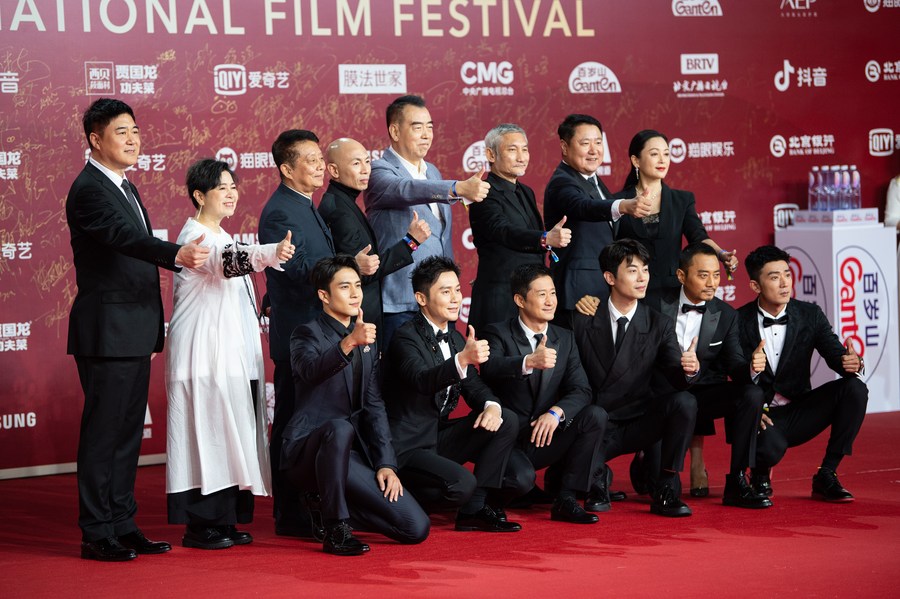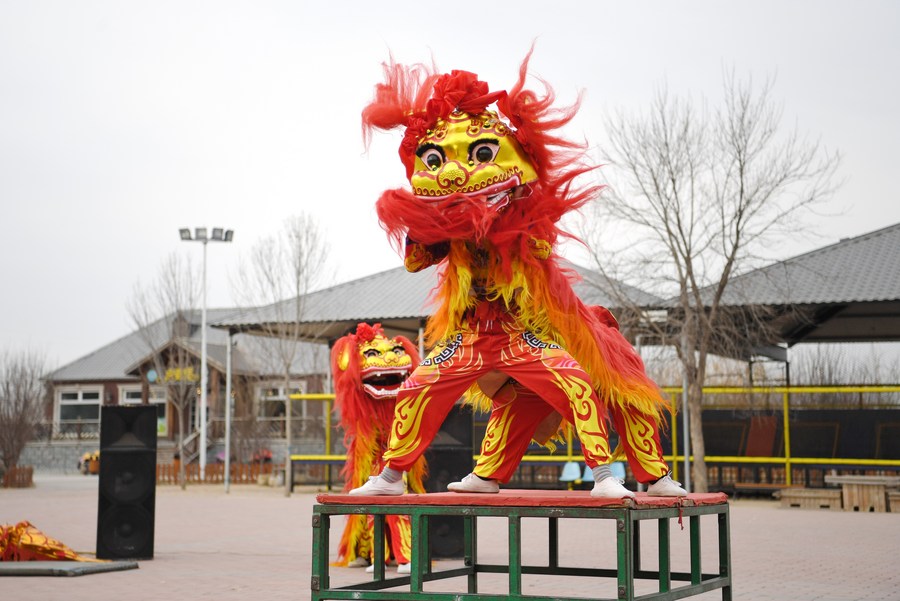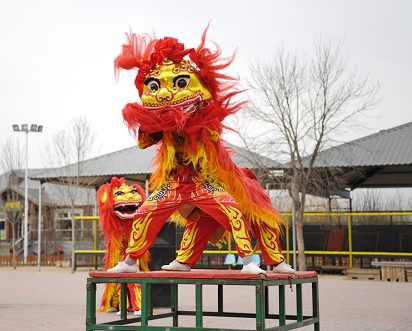
Cast members of the film the Battle at Lake Changjin pose for a group photo on the red carpet for the 11th Beijing International Film Festival in Beijing, capital of China, Sept. 20, 2021. (Xinhua/Chen Zhonghao)
-- China has continued to lead the world in terms of the recovery speed of its movie industry and claimed the worldwide box office crown for the second year in a row.
-- A slew of quality patriotic films have secured big wins over the past year, becoming what experts are labeling "new mainstream" films.
-- Hollywood movies are losing their appeal with Chinese audiences and their influence as a whole is waning in China, a trend felt by moviegoers and noted by industry observers.
by Zhang Yunlong, Li Yue, and Hua Hongli
BEIJING, Dec. 30 (Xinhua) -- 2021 has seen China continue to lead the world in terms of the recovery speed of its movie industry and claim the worldwide box office crown for the second year in a row.
Boosted by the roaring commercial success of domestic blockbusters, China's yearly box office total has hit approximately 47 billion yuan (about 7.38 billion U.S. dollars), ahead of the 4.4 billion dollars registered in North America, according to the latest figures.
This is a huge jump from the 20 billion yuan recorded in 2020 and a further step toward pre-pandemic levels, sending a message of confidence to filmmakers in China and beyond.
NEW MAINSTREAM
A slew of quality patriotic films have secured big wins over the past year, becoming what experts are labeling "new mainstream" films. They not only convey the prevalent values of Chinese society, like many previous movies, but also achieve impressive box office results.
Earning over 5.77 billion yuan since Sept. 30, patriotic Chinese blockbuster "The Battle at Lake Changjin" is undoubtedly the biggest winner. It is currently the highest-grossing title of all time at China's box office, as well as one of the top earners in 2021 globally.
Co-directed by three top directors -- Chen Kaige, Hark Tsui, and Dante Lam -- the movie tells the story of Chinese People's Volunteers soldiers fighting bravely in freezing temperatures in a key campaign at Lake Changjin, or Chosin Reservoir.
The story of young warriors, willing to risk everything to defend their motherland against the world's best-equipped army despite the lack of food and warm clothing amid the bitter cold, has moved many moviegoers to tears.
Produced at a cost of 1.4 billion yuan, or more than 200 million U.S. dollars, the film saw the involvement of nearly all of China's post-production companies, and all aspects of the film's post-production were completed in China, according to the film's producer Yu Dong.
Yin Hong, vice chairman of the China Film Association and a professor at Tsinghua University, hails the film's box office achievements as a comprehensive review of the industrialization outcomes of the Chinese film industry.
They are a shot in the arm to the movie industry of not only China but also the whole world amid the COVID-19 pandemic, Yin adds.
Also among this year's popular patriotic titles are anthology "My Country, My Parents," which adopts the storytelling technique of collective creation similar to "My People, My Country" and "My People, My Homeland"; "Chinese Doctors," a cinematic portrayal of China's fight against COVID-19; "1921," a production intended to provide a panoramic view of the founding of the Communist Party of China 100 years ago.
For future films with ambitions to join the "new mainstream," Yin believes there will be mounting pressure to innovate, as they need to adapt to the changing market landscape.

Pedestrians walk by a poster of comedy "Hi, Mom" in Beijing, capital of China, Feb. 17, 2021. (Xinhua/Chen Zhonghao)
HOLLYWOOD DECLINE
Hollywood movies are losing their appeal with Chinese audiences and their influence as a whole is waning in China, a trend felt by moviegoers and noted by industry observers.
Domestic productions now contribute most of China's yearly box office revenue. In 2021, eight of the top 10 earners are Chinese films, and the three top-grossing titles -- all Chinese films -- earned a combined 15.7 billion yuan, or one-third of the yearly total.
The only two foreign films in the top 10 are U.S. productions "F9: The Fast Saga" and "Godzilla vs. Kong," ranking fifth and eighth on the 2021 chart, with 1.39 billion yuan and 1.23 billion yuan, respectively.
"By and large, as the quality of domestic films improves, audiences are turning away from Hollywood movies," explains Yin.
As China's box office market expands to cover more and more small cities where Hollywood films are lesser-known, the influence of Hollywood movies in terms of their market share in China is also declining.
Rao Shuguang, president of the China Film Critics Association, notes that the repetitive nature of American film franchises means these movies increasingly struggle to meet Chinese audiences' needs and resonate with them.
From a wider perspective, the declining influence of Hollywood in China could also be attributed to moviegoers' preferences under changing international circumstances, especially the current tensions between China and the United States, Rao says.

Folk artists perform lion dance in Jinghe Town of Hejian City, north China's Hebei Province, Feb. 23, 2021. (Xinhua/Zhu Xudong)
2022 AND BEYOND
Still, a closer look into China's box office during different moviegoing periods of 2021 will provide clues as to what areas need to be improved in the future.
Impressive gains were scored during major holidays, in particular, the Chinese Lunar New Year -- also known as Spring Festival -- and October National Day holidays, for which the ticket sales both hit record highs.
Earnings during the weeklong Spring Festival holiday stood at 7.8 billion yuan, registering a 32-percent rise from 2019.
A dark horse from this holiday, tear-jerker comedy "Hi, Mom" completed its run with over 5.4 billion yuan, becoming the third highest-grossing title of all time at China's box office.
However, for screening weeks between major holidays, the box office output is yet to recover to its peak pre-pandemic levels.
The summer movie season spanning three months until Aug. 31 only generated a box office revenue of 7.4 billion yuan, against nearly 18 billion yuan in 2019.
Greater efforts are needed to address the output imbalance among different movie seasons, and to cater to the demand of young moviegoers for high-quality films, according to analysts.
The Chinese movie industry has transitioned to a stage of high-quality development, according to a government plan for promoting the development of the film industry during the 2021-2025 period.
The document foresees greater improvement in the quality of domestic movies, and calls for more quality sci-fi and animated films. In both movie genres, significant progress has been made in recent years.
Following the 2019 sci-fi blockbuster "The Wandering Earth," China's box office is expecting "The Wandering Earth II," which is scheduled to be released in 2023, according to a previous announcement.
After seeing several major animated titles based on ancient mythology in recent years, including "Ne Zha," "Jiang Ziya: Legend of Deification" and "White Snake," Chinese moviegoers and critics have been captivated by a newly released title "I Am What I Am."
Despite moderate box office gains, the animated comedy has received wide acclaim for not only bringing the "lion dance," a Chinese folk art and form of intangible cultural heritage, to the big screen but also for its realistic, worldly approach.
It follows an underdog teenager in south China as he joins hands with two friends to pursue his dream against all odds -- becoming the best lion dance performer.
"Whether it's a huge commercial success or not, this film represents a great foray into exploring reality-themed Chinese animated film production," reads a post on microblogging platform Weibo.
The "down-to-earth" film, Rao says, may signal a change of direction in Chinese animated filmmaking by drawing more inspiration from ordinary people struggling to make miracles happen in their daily lives, instead of gods in mythological stories.
"In 'I Am What I Am,' we see a unique art style of Chinese animation in the making, which breaks away from the old style of Hollywood or Japanese animation," Yin notes.




 A single purchase
A single purchase









